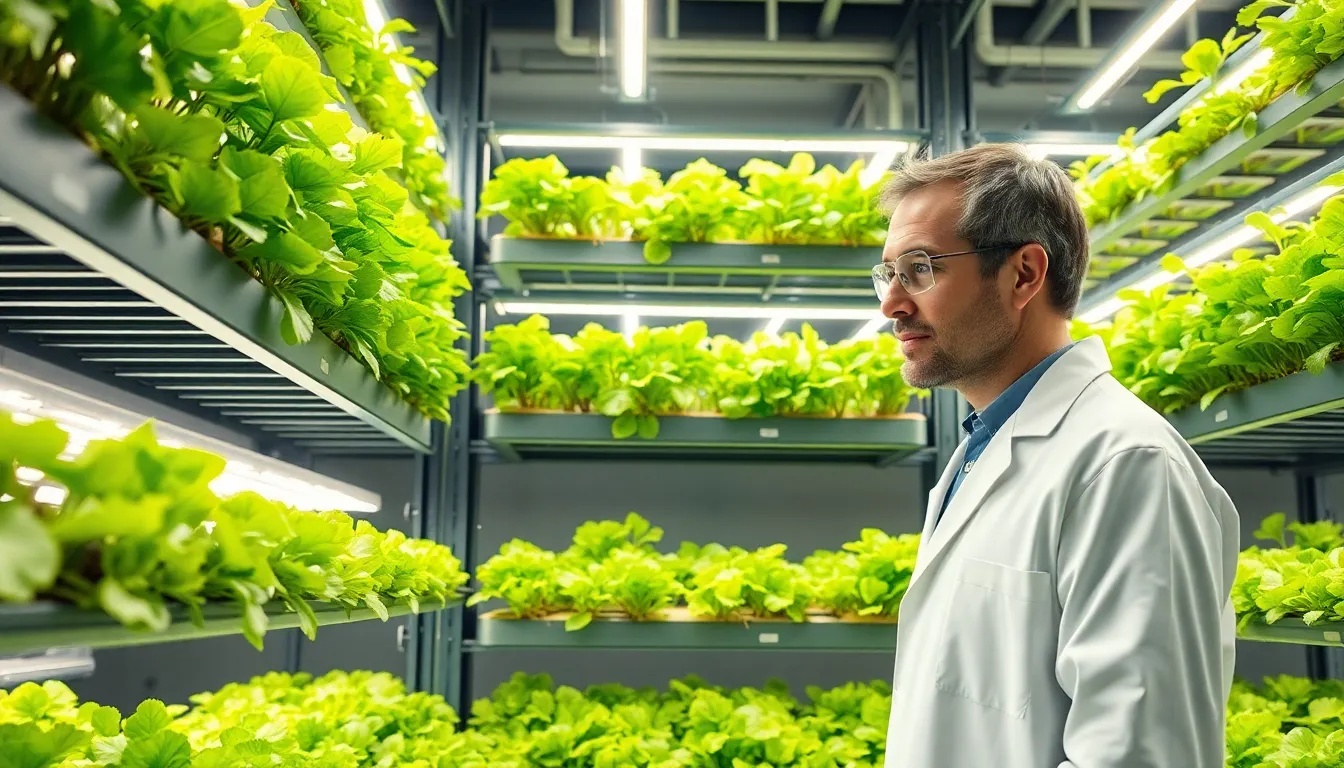In a world where food waste piles up like bad reviews on a restaurant’s Yelp page, sustainable food technology swoops in like a superhero with a cape made of kale. This innovative approach isn’t just about saving the planet; it’s about making sure future generations can enjoy delicious meals without the guilt of contributing to climate change.
Table of Contents
ToggleWhat Is Sustainable Food Technology?
Sustainable food technology refers to innovative practices aimed at enhancing food production while minimizing environmental impacts. This approach prioritizes ecological balance through methods such as vertical farming and aquaponics. Vertical farming utilizes controlled environments to grow crops in urban areas, reducing land use and transportation emissions. Aquaponics combines aquaculture with hydroponics, enabling fish and plants to thrive together, which leads to efficient resource use.
This technology also focuses on reducing food waste by employing methods that prolong shelf life and improve preservation techniques. Advanced packaging solutions, for instance, help extend the freshness of produce, which benefits both consumers and retailers.
Another key aspect involves the development of lab-grown meats and plant-based alternatives that reduce reliance on traditional livestock farming. Such alternatives require fewer resources like water and land, significantly lowering their carbon footprint.
Additionally, sustainable food technology incorporates precision agriculture, which employs data analytics and sensors to optimize resource use. Farmers utilize these technologies to analyze soil health, moisture levels, and crop conditions, leading to more efficient farming practices.
Finally, the integration of blockchain technology in food supply chains enhances transparency. This technology enables consumers to trace the origin of their food, ensuring it meets sustainability standards. Through these combined efforts, sustainable food technology seeks to create a resilient food system that supports both current and future generations.
Key Innovations in Sustainable Food Technology

Sustainable food technology encompasses various innovations that address critical challenges in food production. These advancements include vertical farming and lab-grown meat, which contribute to healthier, eco-friendly food systems.
Vertical Farming
Vertical farming utilizes controlled environments to grow crops in stacked layers. This method significantly reduces land use while maximizing yield. Crop cultivation occurs indoors, allowing for year-round production regardless of climate. Moreover, vertical farms employ hydroponics or aeroponics, eliminating the need for soil and using up to 90% less water than traditional farming. By integrating renewable energy sources, these farms decrease carbon emissions, contributing to a greener food system. Urban settings benefit from vertical farming, as it minimizes transportation costs and fosters local food production.
Lab-Grown Meat
Lab-grown meat represents a groundbreaking shift in meat production. Cultured through cell-based technologies, this method generates meat without raising animals, significantly reducing resource depletion. Production requires approximately 95% less land and up to 96% fewer greenhouse gas emissions compared to conventional livestock farming. Lab-grown meat addresses ethical concerns by eliminating animal slaughter and provides a sustainable alternative to meet growing protein demands. Regulations are evolving to ensure safety and promote acceptance among consumers, leading to broader availability in the market.
Benefits of Sustainable Food Technology
Sustainable food technology significantly enhances food systems while addressing environmental and economic challenges.
Environmental Impact
Sustainable practices reduce resource consumption and combat climate change. Vertical farming minimizes land use, promoting efficient crop production in urban settings. This method utilizes up to 90% less water than traditional farming techniques. Lab-grown meat production cuts greenhouse gas emissions by up to 96%. Advanced packaging solutions preserve food by extending shelf life and reducing waste at various supply chain stages. Improved preservation techniques contribute to lower food waste percentages. Eco-friendly methods enable the conservation of biodiversity and soil resources, fostering ecological balance. These combined effects culminate in a healthier planet and economy.
Economic Considerations
Sustainable food technology fosters economic growth by creating job opportunities in innovative sectors. Urban farms generate local employment, stimulating community involvement. Reduced resource inputs result in cost savings for farmers, decreasing overall operational expenses. Lab-grown meat provides an alternative protein source, potentially reducing market volatility associated with livestock farming. Precise agricultural practices optimize yields, leading to increased profitability for producers. Enhanced supply chain transparency builds consumer trust and boosts brand loyalty. These economic advantages contribute to a more resilient food system that supports diverse stakeholders.
Challenges Facing Sustainable Food Technology
Sustainable food technology faces several challenges that hinder its rapid adoption. Key issues include technological barriers and consumer acceptance.
Technological Barriers
Technological barriers significantly impede the widespread implementation of sustainable food practices. Developing advanced agricultural technologies requires substantial investment and research. Limited access to funding restricts many innovators, especially in developing regions. Additionally, integrating these technologies into existing agricultural systems presents logistical challenges. Skill shortages exist among farmers and workers in implementing new technologies, which can slow progress. Upgrading infrastructure to support innovations like vertical farming or lab-grown meat production demands time and resources that aren’t always available. Overall, these barriers can delay the transition toward more sustainable food systems.
Consumer Acceptance
Consumer acceptance plays a critical role in the success of sustainable food technologies. Many people remain skeptical about lab-grown meat and other innovations, questioning their safety and taste. Educational efforts are essential to build trust and inform consumers about the benefits these technologies offer. Additionally, cultural perceptions influence the acceptance of alternative food sources, making it difficult to shift mindsets. Consumers often prioritize traditional food sources over new options, impacting market demand. Addressing these concerns through transparent marketing efforts can enhance acceptance and pave the way for sustainable practices.
Sustainable food technology stands at the forefront of transforming food systems for a healthier planet. By embracing innovations like vertical farming and lab-grown meat, society can significantly reduce environmental impacts while meeting the demands of a growing population.
The shift towards these practices not only addresses food waste but also promotes ethical consumption and resource efficiency. As challenges arise, fostering consumer acceptance and investing in technology will be crucial for widespread adoption.
The future of food lies in sustainability, and with continued efforts, it’s possible to create a resilient food ecosystem that benefits both people and the planet for generations to come.
